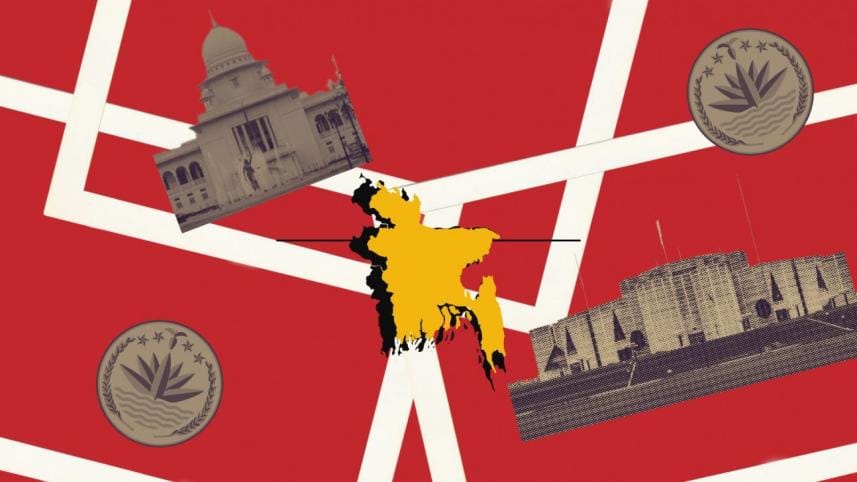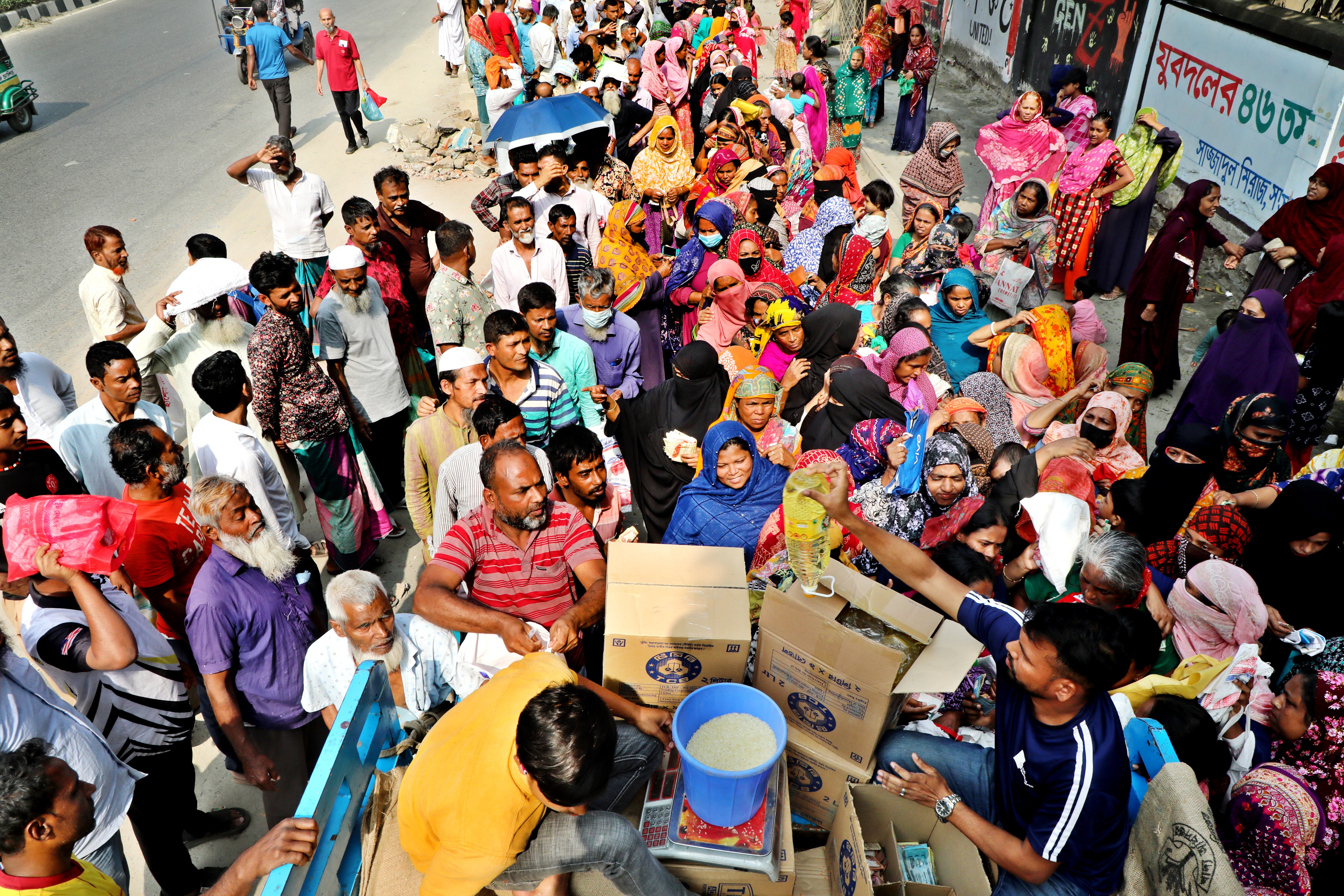Bangladesh's governance crisis is beyond superficial solutions

In the wake of the Monsoon Revolution, Bangladesh stands at a critical juncture, facing what could be its last chance to establish genuine democratic governance. In the past, while the nation's leadership touted various reform initiatives and grand visions, the fundamental issues plaguing the country's governance structure remained largely unaddressed. The current situation demands more than just superficial changes; it requires a complete overhaul of the systems that allowed corruption, inefficiency, and anti-democratic practices to flourish.
The most glaring issue is the hollow nature of Bangladesh's democratic institutions. While the country maintained a facade of democracy from 1991 to 2007, the subsequent years saw an alarming erosion of democratic norms. The judiciary struggled with political interference, the parliament became increasingly ineffective in its oversight role, and anti-corruption bodies like the ACC became mere symbolic entities. This institutional decay wasn't merely an administrative concern; it represented a fundamental betrayal of the democratic aspirations that drove Bangladesh's independence movement.
The economic cost of governance failure
The economic implications of Bangladesh's governance crisis are far-reaching and severe. Foreign direct investment, crucial for economic growth, remained well below potential due to investors' concerns about regulatory unpredictability and corruption. The World Bank estimated that corruption and bureaucratic inefficiencies cost Bangladesh several percentage points in GDP growth annually—a staggering loss for a developing economy.
The banking sector provided a stark example of how poor governance translates into economic losses. Political lending, inadequate oversight, and corruption led to mounting non-performing loans, threatening the stability of the entire financial system. The cost of recapitalising state-owned banks diverted precious resources from critical development needs like education and healthcare.
Small and medium enterprises, which should be the backbone of economic growth, faced particularly harsh conditions. Unable to navigate the complex web of bureaucratic requirements without political connections or substantial bribes, many promising businesses either failed to launch or remained trapped in the informal sector, limiting their growth potential and tax contributions to the state.
The syndicate stranglehold
The entrenchment of syndicates in Bangladesh's economy created a parasitic system that affected every aspect of daily life. In the essential commodities market, powerful cartels manipulated supply chains with devastating efficiency. During religious festivals like Ramadan, these syndicates artificially inflated prices of basic necessities, forcing millions of low-income families to reduce their food consumption.
The transportation sector provides another telling example. Bus and trucking syndicates not only controlled routes and fares but also resisted safety improvements and professional training requirements, contributing to Bangladesh's appalling road safety record. The human cost was enormous—thousands of preventable deaths annually—while the economic cost in terms of lost productivity and healthcare expenses ran into billions of takas.
Even the construction industry couldn't escape syndicate control. A small group of contractors, backed by political patrons, dominated public infrastructure projects, leading to inflated costs and substandard work quality. The collapse of several infrastructure projects highlighted how this system compromised public safety while draining public resources.
Learning from others
While serious, Bangladesh's governance challenges are not unique. Other developing nations have successfully implemented reforms that could serve as models. Indonesia's post-Suharto reforms offer valuable lessons in transitioning from an authoritarian system to a more democratic governance structure. The country's success in strengthening its anti-corruption commission, Komisi Pemberantasan Korupsi (KPK), demonstrates the ability to achieve institutional reform despite political resistance.
Georgia's dramatic transformation of its civil service and reduction in petty corruption provides another instructive example. Through comprehensive reform of police services and government bureaucracy, Georgia significantly improved its business environment and public service delivery within a relatively short period.
Even neighbouring India, despite its challenges, offers useful lessons in maintaining democratic institutions and an independent judiciary. The Indian Supreme Court's activism in governance issues and the election commission's relative independence provide models for institutional autonomy.
A blueprint for reform
Bangladesh needs comprehensive reforms across multiple fronts. First, the judiciary must be granted genuine independence, not just in theory but in practice. This means establishing transparent appointment processes, ensuring adequate funding, and creating effective mechanisms to prevent executive interference. The current backlog of cases—over 37.29 lakh pending cases—must be addressed through modernisation of court procedures and increased judicial capacity.
Second, anti-corruption efforts need to move beyond symbolism. The ACC should be restructured as a truly independent body with robust investigative powers and the authority to prosecute corruption at all levels, including the highest echelons of power. This requires not only legislative changes but also guaranteed budget allocations and protection for ACC officials from political interference.
Third, the civil service needs comprehensive reform focusing on merit-based recruitment and promotion, professional training, and clear accountability mechanisms. This must be accompanied by measures to insulate the bureaucracy from political interference while ensuring its responsiveness to public needs. Digital systems for government services should be expanded to reduce opportunities for corruption and improve efficiency.
Fourth, breaking syndicate control requires a multi-pronged approach: establishing an independent competition commission with real enforcement powers; creating transparent market monitoring systems for essential commodities; implementing strict penalties for price manipulation and anti-competitive practices; developing alternative supply chains to reduce market concentration; and protecting whistleblowers who expose cartel activities.
Fifth, strengthening local governance requires increased fiscal decentralisation and direct election of local officials. There is no alternative to local democratic governance in the true sense of the term. Deployed officials from the centre must be accountable to the elected leadership. Both capacity building for local administration and community participation in development planning are critical for development at the grassroots.
The road ahead
The current global landscape, characterised by uncertainty and rapid transformation, makes these reforms even more urgent. Bangladesh cannot afford to continue with business as usual if it hopes to achieve sustainable development and maintain its economic progress.
The recent mass uprising suggests that citizens are increasingly unwilling to accept the status quo. However, turning this popular dissatisfaction into meaningful change will require more than just street protests. It demands sustained pressure for reform, coupled with clear alternatives to current governance practices.
Success will require building broad coalitions for reform, including business leaders who understand that poor governance ultimately threatens their interests, civil society organisations that can mobilise public support, and reform-minded government officials.
The choice facing Bangladesh is stark: either embrace fundamental reform now or risk deeper instability in the future. The country's leadership must recognise that genuine democratic consolidation, while potentially threatening current power structures, is essential for long-term stability and development. The time for half-measures and symbolic reforms has passed. Bangladesh needs decisive action to address its governance crisis before it's too late.
Dr Habib Zafarullah is adjunct professor of public policy at the University of New England and former professor of public administration at the University of Dhaka. He is the founding president of the South Asian Network for Public Administration. He can be reached at habibzed@gmail.com.
Views expressed in this article are the author's own.
Follow The Daily Star Opinion on Facebook for the latest opinions, commentaries and analyses by experts and professionals. To contribute your article or letter to The Daily Star Opinion, see our guidelines for submission.




 For all latest news, follow The Daily Star's Google News channel.
For all latest news, follow The Daily Star's Google News channel. 



Comments